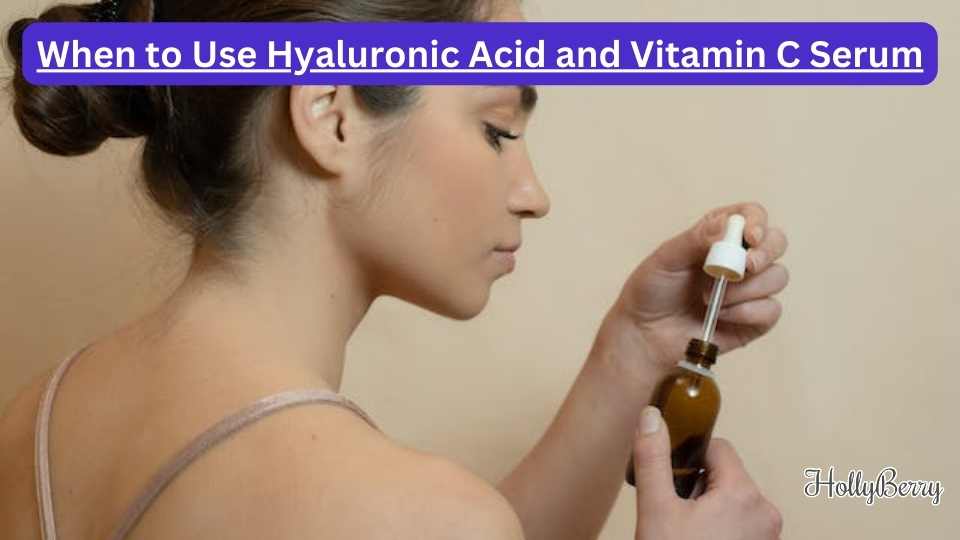
When to Use Hyaluronic Acid and Vitamin C Serum
Share
Expert Guidance

Hyaluronic acid and vitamin C serum are popular skincare ingredients that have been praised for their potential benefits to the skin's appearance and overall health.
Both ingredients work in different ways to rejuvenate and protect the skin, making them excellent choices for those looking to improve their skincare regimen.
Combining these powerful ingredients can result in more effective and efficient skincare routines, as well as help to target and address a variety of skin concerns.
Hyaluronic acid is a naturally occurring substance in the body that has the remarkable ability to attract and hold onto water, making it an excellent hydrator for the skin.
Vitamin C, on the other hand, is a potent antioxidant that not only helps to neutralise free radicals but is also known to boost collagen production and even out skin tone.
When used together, these two ingredients can work synergistically to amplify each other's benefits and improve the overall look and feel of the skin.
In order to maximise the advantages of using hyaluronic acid and vitamin C serum, it's vital to understand the appropriate order and method of application for each ingredient.
Typically, it's recommended to apply products with thinner consistencies first, allowing them to be absorbed more effectively before following with thicker serums or creams.
As such, applying hyaluronic acid first can help to provide a dose of hydration, followed by vitamin C serum to help brighten, protect, and further moisturise the skin.

Order our Hyaluronic Acid
Order our Vitamin C serum
Incorporating Serums into Your Skincare Routine
The Right Time to Apply
Incorporating serums like vitamin C and hyaluronic acid into your skincare routine can greatly benefit your skin.
The best time to apply vitamin C serum is in the morning, as it offers additional protection for the skin during the day.
On the other hand, hyaluronic acid serum should be applied after cleansing and toning, but before applying any prescription creams, moisturisers, or oils.
Layering Your Skincare Products
When layering your skincare routine with serums, follow this order:
- Cleanser: Gently wash your face with a suitable cleanser.
- Toner: Apply a toner or facial mist and do not pat dry.
- Vitamin C Serum: Apply onto a clean face in the morning.
- Hyaluronic Acid Serum: Gently apply onto your damp face before using a moisturiser or other creams.
- Prescription Creams: Apply any prescription creams or treatments, if necessary.
- Moisturiser: Seal in your serums with a moisturising lotion or gel.
- Sunscreen: Complete your morning routine with a broad-spectrum sunscreen.
For your evening routine, consider incorporating a retinol-based serum after the hyaluronic acid serum, as retinol is known to aid skin cell regeneration.
Frequency and Dosage
It is recommended to use vitamin C and hyaluronic acid serums daily for optimal results. Follow these steps in applying serums:
- Vitamin C: Use a pea-sized amount, covering your entire face.
- Hyaluronic Acid: Stick to a few drops, enough to cover your face without diluting other products.
By following these guidelines, you can successfully incorporate vitamin C and hyaluronic acid serums into your skincare routine.
Remember, consistency is key to achieving radiant and healthy skin.
Addressing Skin Concerns
Combating Signs of Aging
Hyaluronic acid and vitamin C serum can effectively help in reducing the signs of ageing such as wrinkles and fine lines.
Hyaluronic acid has the ability to retain water, keeping the skin hydrated and maintaining its elastic properties.
Vitamin C, on the other hand, is known for its antioxidant properties that protect the skin from sun damage and promote the production of collagen, further supporting a youthful appearance.
In addition, the use of hyaluronic acid and vitamin C serums can also benefit those with sensitive skin or an impaired skin barrier, since these two ingredients work together to strengthen and protect the skin without causing irritation.
Improving Skin Hydration
Both hyaluronic acid and vitamin C work effectively to improve skin hydration. Hyaluronic acid can hold up to 1,000 times its weight in water, making it an excellent moisturiser for dry skin.
When combined with vitamin C, these two ingredients work together to deliver a potent hydration boost and improve the overall skin texture.
For those with acne-prone skin, the enhanced hydration can help in balancing oil production and reducing the occurrence of breakouts, while the antioxidants in vitamin C may help soothe inflammation.
Fading Dark Spots and Hyperpigmentation
Vitamin C is known for its ability to fade dark spots and even out hyperpigmentation caused by sun damage or ageing. By inhibiting melanin production, vitamin C can help brighten the complexion and reveal a more even skin tone.
When paired with hyaluronic acid, the skin can better absorb and maintain the benefits of vitamin C, leading to improved results in reducing pigmentation and promoting a more radiant and youthful appearance.
In conclusion, hyaluronic acid and vitamin C serums can effectively address various skin concerns by combating signs of aging, improving skin hydration, and fading dark spots and hyperpigmentation.
These two ingredients work in synergy to protect, nourish, and rejuvenate the skin, making them a valuable addition to any skincare routine.
